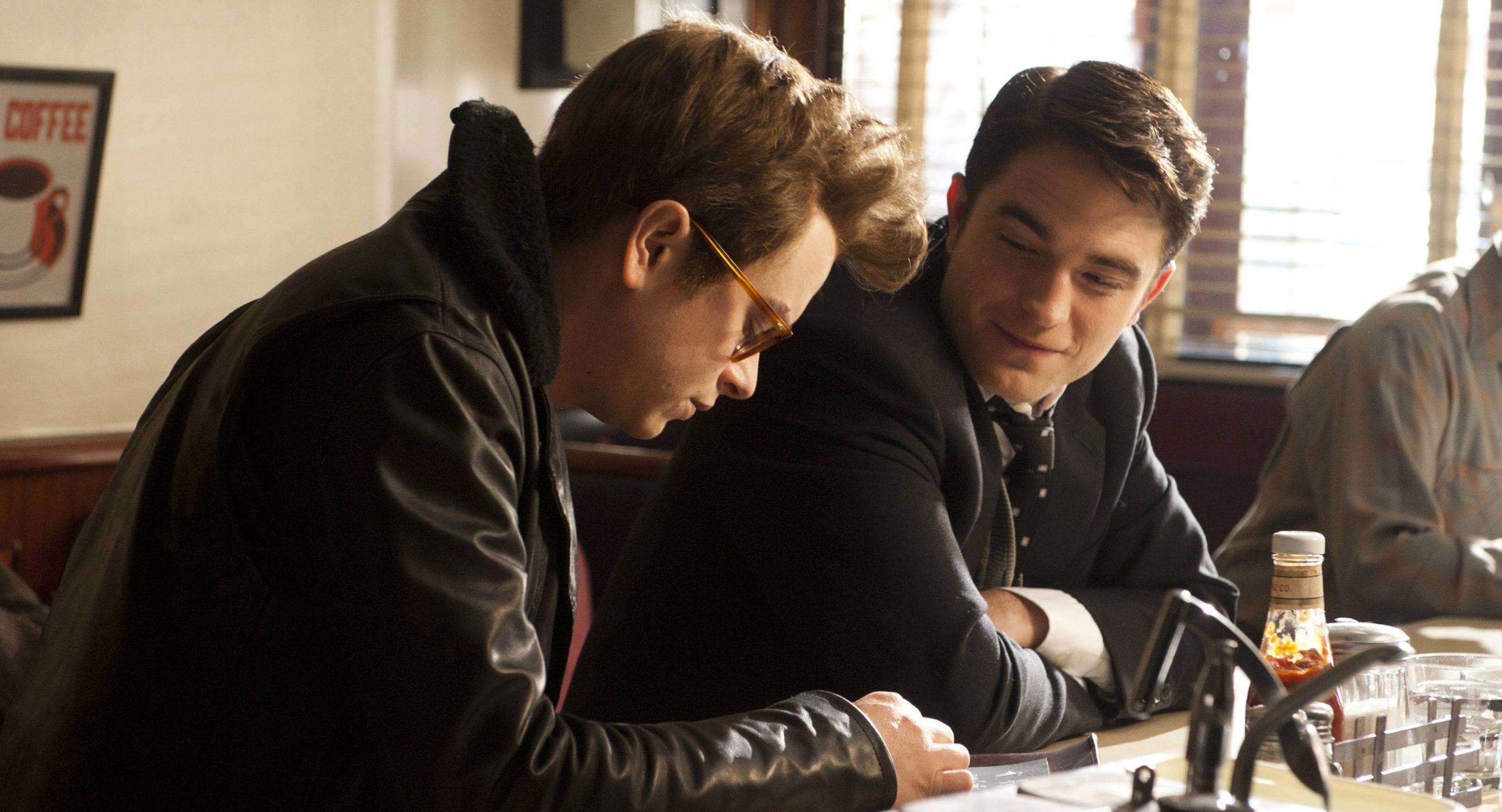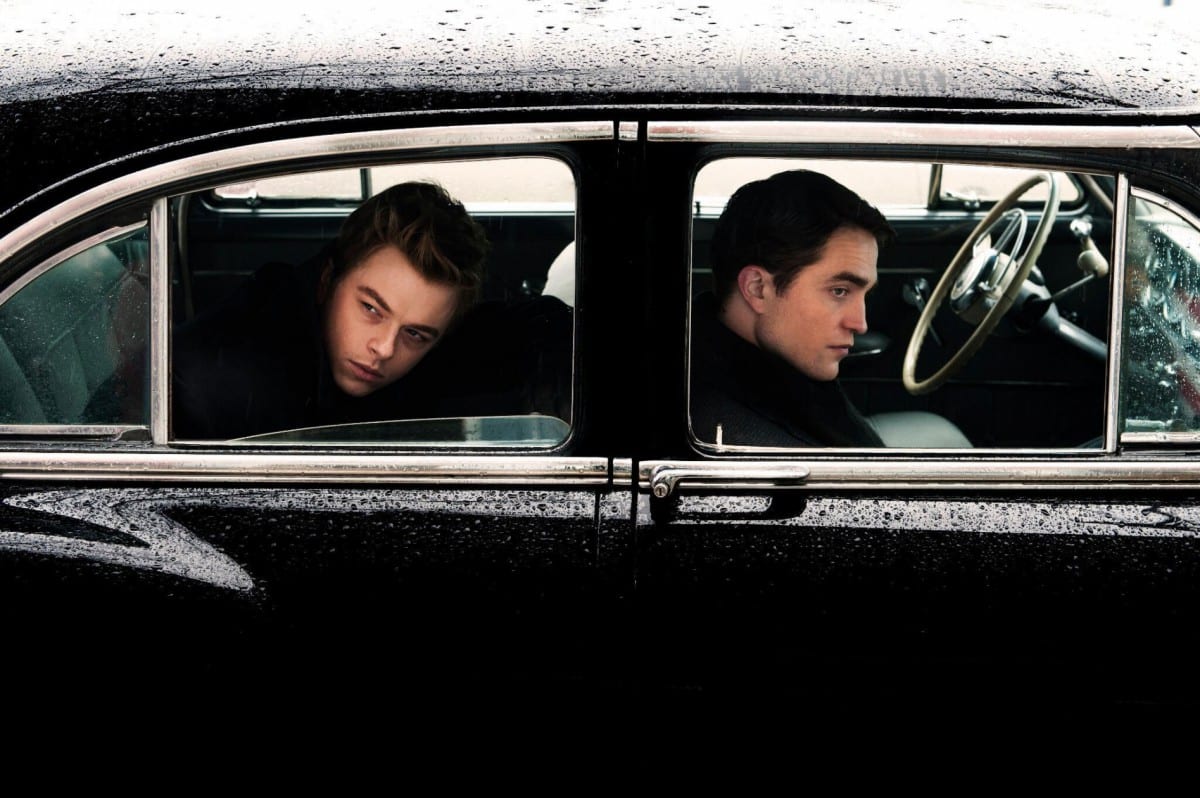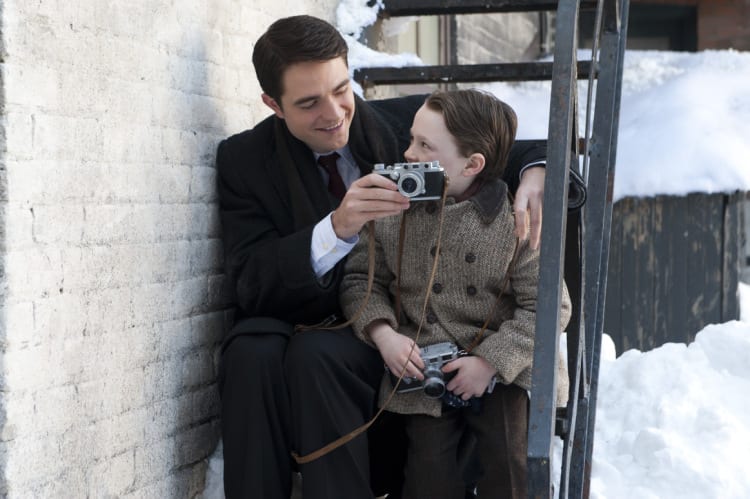From what I’ve read, Dennis Stock was an irascible guy. In the later stages of his life they called him ‘Dennis the Menace’ in the Magnum offices.
That’s true. Dennis Stock didn’t take any prisoners, he was no mercy, incredible. He had five ex-wives and a few of them didn’t want to talk to us about him – he didn’t leave them on good terms. We portrayed his relationship with his son at the end of the film as more positive than it was in real life. d
Did Robert Pattinson have an interest in photography when you cast him as Dennis Stock?
I don’t think so. We made sure he got a camera months in advance to familiarise himself with that and to get a sense of wanting to take a picture of moments. Of course when you shoot with film you don’t take as many pictures. When I looked at the Magnum contact sheets, the Times Square sequence for example, there are are six shots. You’re much more focused.
You considered shooting the film in black and white but decided it might impinge on Stock’s photography?
I felt like we were not giving him enough credit. Of course there were other voices saying we should do black and white, because of financial reasons, but I’m happy that we didn’t do it.

A lot of photography writing talks about technique. Dennis Stock seemed capable of putting the hours in until James Dean finally relaxed and gave enough of himself so Stock could hold the camera and click the shutter. Do you agree with that?
Obviously a drive and hard work is something that can get you somewhere. Talent is not always the top priority that people associate success with. You have to spend time with someone if you want to take their photograph. I’m not sure if James Dean knew the quality of the pictures. I think Stock saw him and thought: “There’s a guy that wants to do something, he wants to do something outside the studio system.”
Is that relationship between photographer and subject quite intuitive, or do you have to actively work at that dynamic?
The relationship I have with people that go on for years seems to be developed organically. With Like Tom Waits, who is a gift for photographers; I photographed him twice in the 70s and he was very reluctant, then I approached him again five years later for pictures and he was much more open.
Since then we have a relationship, but at first, no. With U2, this was not a band I liked initially; they persuaded me, It was a similar story with Depeche Mode, so there was no logic about any of these long relationships when they started. You just grow to like each other and to see that you actually mix very well. But if Bruce Springsteen or Bob Dylan called, I would say have said yes straight away.

Now you’re sought after as a photographer, is it strange to reflect on the start of your career where you had to really put the hours in and convince people and chase stories?
I put more hours in now than I ever have, because it’s so different now. But it’s not the same thing with these hours. I used to hang around a lot and wait and wait, and go and see if I can photograph somebody. That doesn’t happen anymore, it’s much more of a business unfortunately. I’ve recently had two very big shows in Holland, and looking back at my work over 40 years, there were moments of real desperation where I looked at all the contact sheets. I thought: “How could I have wasted my life on this shit?”
Then you find something that you think made it worth again. You decide to drive into one road, but I’m lucky enough that I still have images from the early days that I love. I wasn’t clear to myself what I was looking for, and also I think I was scared of the desperation of not having anything, because the only think I liked in life was taking pictures, but I wasn’t good enough at it, and I had a lot of despair in some years. That makes you better at what you do.
Do you still carry a camera with you?
I do a lot more on the iPhone, the snapshots are on my iPhone now. I just don’t like too much walking around with a camera. That’s what I always loved about painters – it’s not this mechanical thing, it’s more with the hands. I don’t take enough pictures, but my focus now is so on filmmaking that I don’t think I can give photography the same attention and time and energy as I always have.
Do you miss it?
I did a shoot last week with U2 again, and that was great. It’s like Zen, it feels so comfortable. And with film I don’t feel comfortable yet, maybe that will never come, I don’t know. In photography I know what I can do, with a film I don’t know so much what I’m capable of, so it’s much more of an adventure and I think it’s worth investigating and investing in that.
What would you say to the Anton Corbijn just starting out on your career?
Learn a bit about life before you go any further. I was so narrow minded and not aware of bigger things in life. I think what I confused when I was young was friendship and work, andI found it hard that somebody I worked with suddenly started to work with a lot of other photographers, because I felt it’s almost like breaking up a marriage. You really have to separate these things. It’s great to work with friends, but there’s work and there’s friendship.
If I could arrange for you to meet Dennis Stock at the start of his career, what would you ask him?
He’s a documentary photographer, that’s his language. But I wonder why he didn’t do more portraits of James Dean. Having said that, I’m not in a position to give him advice because he did great work. He always photographed James Dean in an environment, and I love being able to see that environment 60 years later. With portraiture, you never get that sense of the time, of the era, and in Dennis’ picture you do get that.
Life is in cinemas from today.
Follow Anton on Instagram. Buy the latest issue of BJP here.

